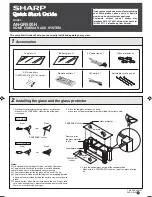
3
To Reduce the Risk of Injury From Jams, Slips Or Thrown Pieces
(Kickbacks Or Throwbacks)
Inspect your work area.
• Keep work area clean.
• Cluttered areas and benches invite acci-
dents. Floor must not be slippery from
wax or sawdust.
• To reduce the risk of burns or other fire
damage, never use the work stand and
tool near flammable liquids, vapors or
gases.
Plan Ahead To Protect Your Eyes, Hands, Face and Ears
Dress for safety
• Plan ahead to protect your eyes, hands,
face, ears.
• Do not wear loose clothing, gloves,
neckties or jewelry (rings, wrist
watches). They can get caught and draw
you into moving parts.
• Wear nonslip footwear.
• Tie back long hair.
• Roll long sleeves above the elbow.
• Noise levels vary widely. To reduce the
risk of possible hearing damage, wear
ear plugs or muffs when using tool for
hours at a time.
• For dusty operations, wear a dust mask
along with safety goggles.
• Any power tool can throw foreign objects
into the eyes, which can result in severe
eye damage. Always wear safety gog-
gles, not glasses, complying with ANSI
Z87.1(or in Canada CSA Z94-3-M88)
shown on package. Everyday eye-
glasses have only impact resistant
lenses. They are not safety glasses.
Safety Goggles are available at many
local retail stores. Glasses or goggles
not in compliance with ANSI or CSA
could seriously hurt you when they
break.
Whenever Attached Tool Is Running
Keep Children Away
• Keep all visitors a safe distance from the
tool.
• Make sure bystanders are clear of the
tool and workpiece.
Before freeing jammed material
• Turn switch "OFF".
• Wait for all moving parts to stop.
• Unplug the tool.
Before leaving the work stand and tool
• Turn the tool off.
• Wait for tool to stop.
• Unplug the tool.
• Make workshop child-proof. Lock the
shop. Disconnect master switches.



































